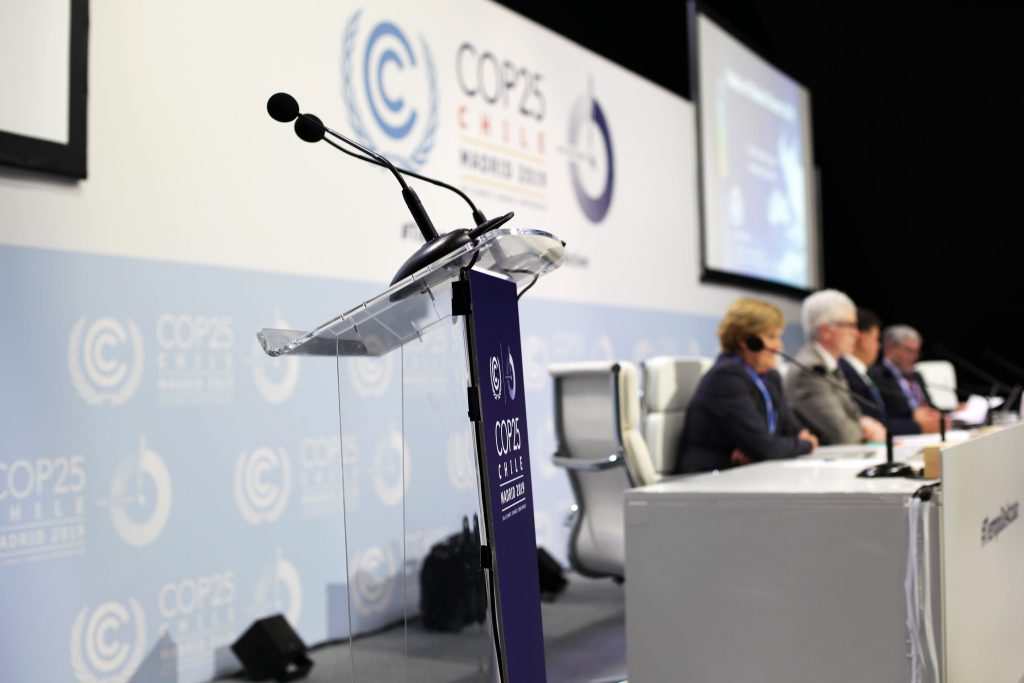04/12/2019
The URV participates in the UN Climate Change Conference COP25
The URV presented its progress in reducing greenhouse gas emissions, the Aurora Network project for measuring scientific contributions to social challenges, research on governance and environmental law, and a sustainable desalination project

The URV presented its progress in reducing greenhouse gas emissions, the Aurora Network project for measuring scientific contributions to social challenges, research on governance and environmental law, and a sustainable desalination project
The URV has various programmes, research projects and initiatives that aim to contribute to the knowledge about climate change and reduce its effects. Different University groups took part in the UN Climate Change Conference COP25, held in Madrid from the 2 to 13 December, to share their own experiences and contribute to decision-making on global action. URV students, academic and scientific staff as well as management staff attended the United Nations area where the conferences and negotiations between the member countries take place, as well as the space where the social initiatives are announced.
Researchers from the Centre for Environmental Law Studies in Tarragona (CEDAT) and members of the Association of URV former and current students of Environmental Law joined one of the delegations of the UN Climate Change Secretariat that brings together research organizations that contribute to developing strategies for addressing the causes and consequences of climate change. They, and the rest of the delegations, made contributions to the United Nations Framework Convention on Climate Change, which is working to implement the Kyoto Protocol and the Paris Agreement to contain global warming.
In addition to this space, which is administered by the United Nations, the conference has an open space for dialogue, awareness and decision-making shared by administrations, public and private institutions, entrepreneurs and companies, universities and NGOs. It is within this framework that the Vice-Rector for Research and Scientific Planning, Francesc Díaz, presented the Bibliometrics project of the Aurora Network, the international university network of which the URV is a member. In a round table discussion on the role played by higher education in meeting the challenges of sustainable development goals, Díaz presented this collaborative project that elaborates a scorecard on the relevance and social impact of university research.
The head of the URV’s Environment Plan, Toni de la Torre, made a presentation on the URV’s experience in reducing greenhouse gas emissions. He explained aspects that other institutions could also apply, including the prioritization criteria and the data collection system for designing and evaluating actions. He also discussed the actions that have been successful and those that have not, as well as the role of the alliances with the administrations and agents of the territory.
In addition, in a science and innovation space, the URV in collaboration with the company WGA Water Global Access SL presented a new desalination technology that reduces the consumption of energy with respect to the current technology. It is powered by wind and solar energy and does not spill toxic waste water into the sea.
Susana Borràs, URV researcher and spokesperson for Social Commitment, presented the results of the research project “Global Climate Constitution: Governance and Law in a Complex Context (CONCLIMA)”, in a session on Climate Law and Governance. CEDAT researchers took part in the workshop “Climate Crisis: A Question of Justice and Human Rights” and in a session held at Carlos III University on “Climate litigation and justice”. Borràs and de la Torre were also on the round table of the work group on Sustainable Development Goals of the Inter-University Council of Catalonia.
Students doing the Master’s degree in Environmental Law and doctoral students in this area participated as speakers or assistants in different sessions of the COP25 conference and in parallel activities at universities in Madrid.
More news about: canvi climàtic, climate change
